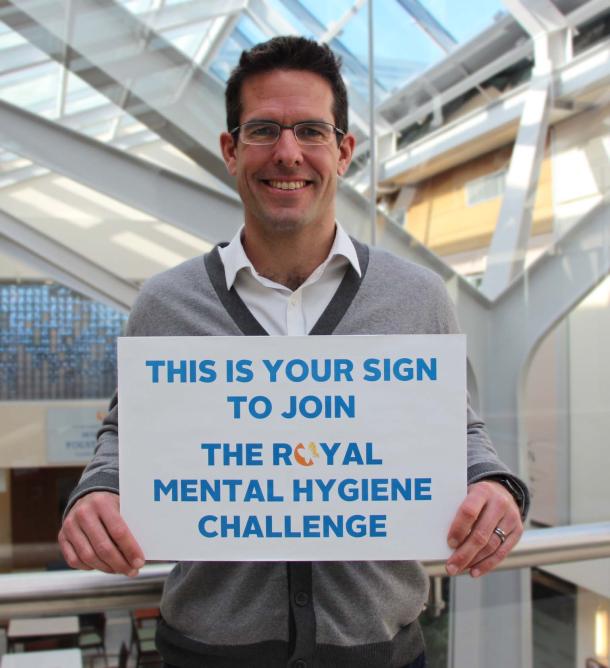In the hustle and bustle of daily life, maintaining our good mental health often takes a back seat, but it doesn’t need to be this way – and it doesn’t need to be complicated.
A growing body of data is showing that one way to support our mental well-being is to adopt the practice of mental hygiene.
Hygienic practices are small actions we can do to protect our health, like brushing our teeth. Mental hygiene involves adopting certain healthy habits, coping strategies, and self-care techniques to maintain mental health and well-being.
“We tend to think about taking care of our minds only when there's something wrong. We don't yet have the reflex of thinking about it from a maintenance perspective like we do the rest of the body,” says Guillaume Tremblay, a nurse practitioner at The Royal’s Brockville Mental Health Centre.
Tremblay is one of the authors of Mental Hygiene: What It Is, Implications, and Future Directions, a journal article written in 2021, with Nicole Rodrigues and Dr. Sanjiv Gulati. The authors present a list of research-based practices that support good mental health if done regularly, including nature exposure and contemplative practices such as meditation, prayer, and focused breathing. More importantly, they make a case for the universal adoption of a mental hygiene framework and propose the need for specific public-facing recommendations for mental health.
As Tremblay points out, when it comes to our physical health there is a universally accepted benchmark of what we should be doing, and for how long. The World Health Organization recommends adults aim for a minimum of 150 minutes of moderate to vigorous exercise every week. This is taught in schools, promoted by public health agencies, and shared by the media – it’s a framework that is widely understood.
Surprisingly, there are no universal recommendations regarding how long we should spend on our mental health on a daily basis. As Tremblay and his colleagues laid out in their paper, spending as little as 10 minutes every day engaging in mental hygiene can make a difference.
Small steps, big impact
Mental hygiene is not only a mindset, it’s a growing movement.
Tremblay’s enthusiasm for mental hygiene inspired The Royal Mental Hygiene Challenge, a community initiative designed to encourage participants to spend ten minutes on their mental hygiene every day for 31 days. Now entering into its third year, the challenge is set to kick off again this March.
Survey data collected during the first two years of the Mental Hygiene Challenge has shown that engaging in daily mental hygiene practices supports mental well-being.
Mental well-being refers to a state of overall well-being that is more than just the absence of illness. To say that someone has good mental well-being means they are in a better place to cope with stress, anxiety, or other negative emotions, and bounce back relatively well from adversity. Good mental well-being often goes hand in hand with positive feelings such as optimism, happiness, gratitude, or satisfaction.
“We tend to think about taking care of our minds only when there's something wrong. We don't yet have the reflex of thinking about it from maintenance perspective like we do the rest of the body,” says Guillaume Tremblay, a nurse practitioner at The Royal’s Brockville Mental Health Centre.
The evaluation of the mental hygiene concept is continuing this year. Key findings will be communicated in an upcoming article, The Mental Hygiene Challenge – A Novel Public Mental Health Intervention, which has been accepted for publication and is in press with the Canadian Journal of Community Mental Health.
“The program evaluation offers a promising signal that mental hygiene supports mental well-being and we're continuing to work towards establishing public-facing recommendations,” says Rodrigues, co-author, who is responsible for the evaluation’s framework. “And anecdotally, the feedback is overwhelmingly fantastic.”
Joan C., a member of the Mental Hygiene Challenge Facebook group, posted this response after last year’s challenge:
“I joined the challenge to get a handle, for myself, on what I did each day relative to how I felt. It was eye-opening and I’ve reinforced that exercise and fresh air… being more social, and journaling have the most positive effect on my mental well-being. Journaling is something I’ve done since my teens and for me, it’s very therapeutic. Thank you for the challenge. It’s helped me feel positive and made it easier to move forward.”
While taking care of our mental health should be a routine part of our everyday lives, we’re not quite there yet.
Tremblay’s goal is for the idea of mental hygiene to be adopted, endorsed, and promoted by health organizations in Canada and around the world, and eventually becomes as automatic as brushing our teeth.
Cara Vaccarino, president and CEO of The Royal, underlines the urgency of developing effective mental health tools and approaches, especially considering the impact of the ongoing global pandemic. With one in five Canadians experiencing mental health challenges in their lifetime, the need for preventive measures has never been more urgent.
“The Royal’s Mental Hygiene Challenge is not merely a call to action, it's a holistic approach to mental hygiene – an act of preventive maintenance for the mind,” says Vaccarino. “This initiative is about empowering ourselves through a shift in practice and perspective. Maintaining good mental health requires consistent effort and attention.”
Registration is now open for this year’s Mental Hygiene Challenge. The mental hygiene practices that are part of the challenge are all backed by research, accessible, easily incorporated into daily routines, and don’t require special equipment or training. Participants receive a calendar for progress tracking, links to helpful resources and how-to videos, and an invitation to join a dedicated Facebook community for extra support. There is no cost to join. Click here to sign up for this year’s challenge.


